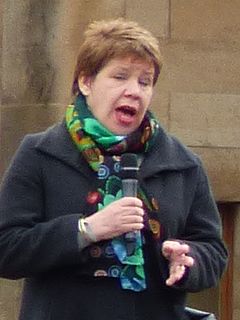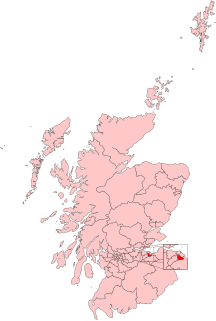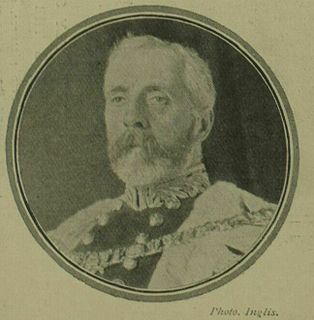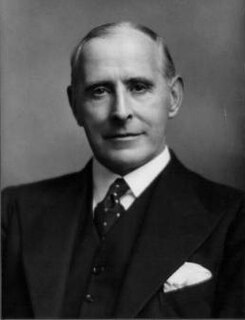
Lesley Hinds is a Scottish Labour Party politician who served as Lord Provost of Edinburgh, Scotland from 2003 to 2007.

Edinburgh South is a constituency of the House of Commons of the UK Parliament created in 1885. The constituency has been represented by the Labour Party's Ian Murray since 2010. Murray was the only Labour MP in Scotland to retain his seat at the 2015 general election, and did so with an increased majority, where he result rendered it the 23rd-most marginal Labour seat by percentage of majority nationwide.

Edinburgh Central was a burgh constituency of the House of Commons of the Parliament of the United Kingdom from 1885 to 2005. It elected one Member of Parliament (MP) by the first past the post system of election.
Glasgow Bridgeton was a parliamentary constituency in the city of Glasgow. From 1885 to 1974, it returned one Member of Parliament (MP) to the House of Commons of the Parliament of the United Kingdom, elected by the first-past-the-post voting system.
Bristol North was a borough constituency which returned one Member of Parliament (MP) to the House of Commons of the UK Parliament from 1885 until it was abolished for the 1950 general election.

Alfred Henry Scott was a British Liberal politician.
Avon is a former New Zealand parliamentary electorate. It was created for the 1861 general election and existed until 1996. It was represented by 13 Members of Parliament and was held by Independents, Liberal Party or Labour Party representatives.
The Progressive Party was a municipal political organisation that operated in several Scottish cities and towns in the 20th century. It was based on tacit anti-Labour co-operation between the Unionist Party, Scottish Liberals and independents.

Andrew Macbeth Anderson, Lord Anderson was a Scottish barrister, judge and Liberal Party politician.

Sir James Puckering Gibson, 1st Baronet, was a Scottish Liberal Party politician. He was Lord Provost of Edinburgh 1906-9 and Liberal MP for Edinburgh East from 1909 to 1912.
The Edinburgh East by-election was a Parliamentary by-election. It returned one Member of Parliament to the House of Commons of the United Kingdom, elected by the first past the post voting system.

The Linlithgowshire by-election was a Parliamentary by-election. It returned one Member of Parliament to the House of Commons of the United Kingdom, elected by the first past the post voting system.

An Election to the Edinburgh Corporation was held on 7 May 1968, alongside municipal elections across Scotland. Of the councils 68 seats, 22 were up for election. Despite receiving the most votes of any single party, the SNP won only 7 seats. Unlike in Glasgow, the Progressives and Conservatives did not run on a joint ticket. Despite that however the parties only ran competing candidates in the Gorgie-Dalry ward.

An Election to the Edinburgh Corporation was held on 6 May 1969, alongside municipal elections across Scotland. Of the councils 68 seats, 23 were up for election.

An Election to the Edinburgh Corporation was held on 2 May 1972, alongside municipal elections across Scotland. Of the councils 69 seats, 23 were up for election.

James Rankin Rutherford was a Scottish Liberal Party politician. He was the Provost of Kirkintilloch 1931−33 and Convener of the County Council 1939-1945.
An Election to Leith Burgh Council was held on 6 November 1894, alongside municipal elections across Scotland, and the wider British local elections. Contests took place in 3 of the burghs 6 wards, with candidates in the remaining 3 being returned unopposed.
The 1894 United Kingdom local elections took place in late 1894. The elections were the first following the Local Government Act 1894, which had created Urban and Rural Districts in England and Wales, and saw the election of members to these various new districts.
An Election to the Edinburgh Corporation was held on 2 November 1897, alongside municipal elections across Scotland, and the wider British local elections. Contests took place in 5 of the cities 13 wards, with candidates in the remaining 8 being returned unopposed. Three Portobello wards also held elections. The election was relatively quiet, with no particularly important issues being raised. As a result, the main focus of the election was on the Lord Provost, and the personalities of the individual candidates.
Election for Edinburgh Corporation were held on Tuesday 3 November 1896, alongside municipal elections across Scotland, and the wider British local elections. The election was relatively quiet, with no particularly important issues being raised, and contests took place in only 2 of the cities 13 wards, with candidates in the remaining 11 being returned unopposed.













